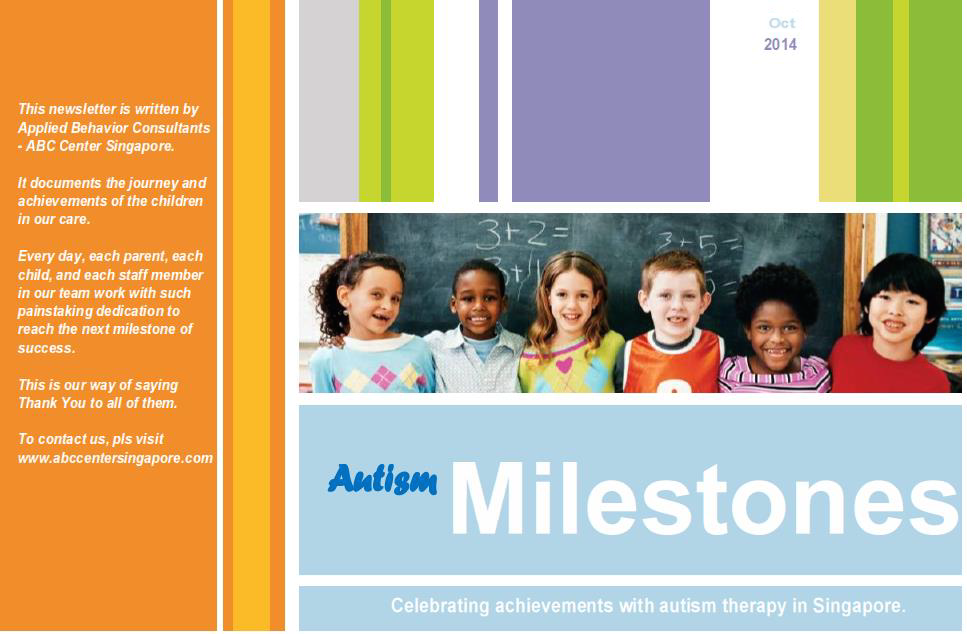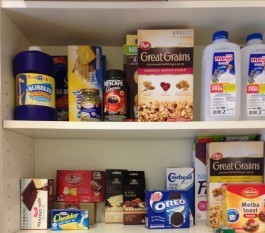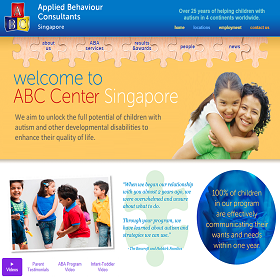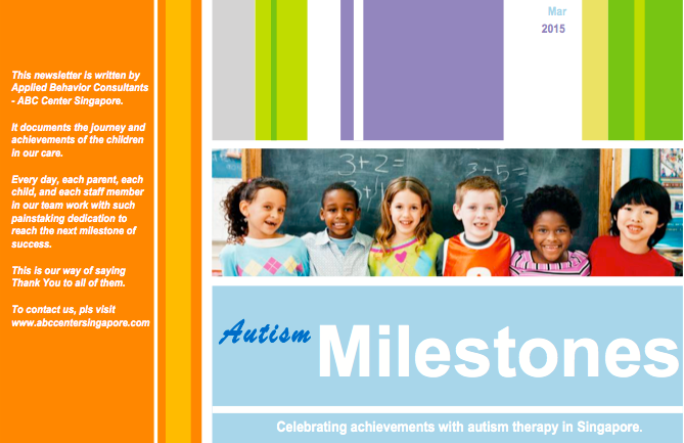
Daisy* was barely 14 months old when she started at ABC Center Singapore’s Infant/Toddler Program. When she joined, she did not have a formal autism diagnosis, but showed symptoms of autism and developmental delay – her skills were significantly behind those of peers of her age. Today, she is a bright and happy 28 month old, with skills now fully in line with typical peers. We are happy to see her graduating from our center – our youngest ever!
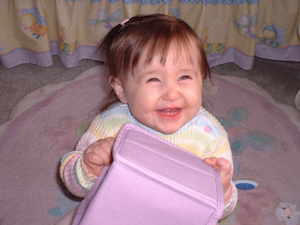 We speak with Ms Hui Ling Loh, MA, BCBA, ABC Center Singapore’s Clinical Supervisor and Ms. Anna Miranda, Behavior Analyst, on Daisy’s great progress over the past year.
We speak with Ms Hui Ling Loh, MA, BCBA, ABC Center Singapore’s Clinical Supervisor and Ms. Anna Miranda, Behavior Analyst, on Daisy’s great progress over the past year.
Daisy started at ABC Center at only 14 months old. How do you know what is needed by such a young infant?
When Daisy’s parents first saw us, they talked about ‘red flags’ which worried them very much. She would not look or respond whenever her name was called. She was not babbling yet at 14 months, unlike other infants her age. Her dad said she just kept crying very loudly most of the time. So, even if she did not have a formal diagnosis of autism, Daisy’s parents came to see if we could help.
Do you accept children even without an autism diagnosis?
Yes. As long as there are signs of behavioral or developmental issues, we do a full assessment of the child to see how we can be of help. This is what we did for Daisy.
Is it important to start therapy while the child is so young?
Definitely! The earlier, the better. Clinical data show that children who start therapy before 4yrs old, and who do it at the right level of intensiveness, have a higher chance of success.
This is the reason why ABC Center has an Infant/Toddler Program – so that we can help children as early as possible.
So, how did Daisy’s assessment go?
We verified that there were areas that needed help. While she was already 14 months old, her communication skills were equivalent to a 4-7 month old. Her ability to understand and respond to words was limited. For instance, when we ask her ‘Where is Mama?’, she would not be able to point at Mama, unlike other toddlers her age.
She was also not yet approximating sounds/ words to express what she wanted, which we expect from infants her age. Daisy would just cry.
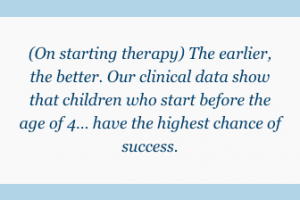 Beyond her communication skills, did you see any other issues?
Beyond her communication skills, did you see any other issues?
Her attention skills were also limited. For instance, when we said ‘Look’ while pointing at an interesting object, Daisy would not look at the object.
She also did not show play skills yet. If you put her at a little area with toys, she would not engage with the toys, but would just sit and cry instead.
Her imitation skills were equivalent to a 3-6 month old. This was important to correct as the ability to imitate is foundational to how we all learn.
That seems like a lot to work on… how do you teach all that to such a young infant?
Our Infant/Toddler Program is very unique because we are able to use Applied Behavior Analysis (ABA) principles in a play-based program that allows the toddler to learn.
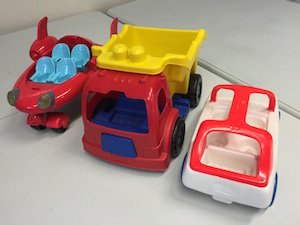
The toy trucks that Daisy loved. ABC’s Infant/Toddler Program is play-based ABA which successfully teaches infants starting with the toys and activities they like.
How do you do that?
We look at what interests the toddler the most, and begin teaching from there. When Daisy started, she loved one of our little toy trucks. So we would play with this toy truck and we started to expand her vocabulary by labeling the objects the little truck was meeting along the way.
We also used it to teach her imitation. We would roll the truck. We would push it along the tracks. We would make it go up and go down the slide. She learned to imitate these actions.
Did this method also help her learn to talk?
Yes, for sure. As she began to imitate actions, we saw that she also began to imitate the lip movements needed to form words. So, we worked on this to teach her to vocalize all the words she is interested in.
So, does she now know a lot of words?
A lot of words, indeed! Her lessons allowed her to expand her vocabulary very well. She now knows milk, cat, book, juice, mommy, daddy, pants, car, apple, cookie, shirt, dog, toothbrush, bird, spoon, water, …..
(goes on to read a long long list of words)….
Wait, did you say, ‘toothbrush’? You said you would focus on things she likes, how could you have taught her the word ‘toothbrush’?
Our teachers have a special technique of teaching, even areas where the child is less interested in. And that’s how we teach words like ‘toothbrush’. As always, for every lesson she had, we had full data of how she was progressing so we knew if she was learning well. Our results show that 100% of children make progress.
Your teachers have to be very playful and very structured at the same time to do that?
Yes, I am proud of the teachers who worked with Daisy. The skill involved to take a structured lesson and teach it in a playful way is very unique. The teachers who worked with Daisy were very creative thinkers, and they were very fast thinkers as well. They also have a way of engaging infants well… and yet are still very data-based and structured in their data taking.
How about Daisy’s parents? They must have also worked hard on this journey.
Daisy’s parents helped a lot, particularly on her self-help skills. They made sure that whatever was already learned here at the center was practiced at home, like eating with a spoon, or drinking from a cup, or cleaning up after playing.
Both her parents joined our 8-week training program so they were familiar with what needed to be done.
Also, we made sure that Daisy’s mom was involved in some of her lessons. We had some lessons where mom was the one asking Daisy to take off her shoes, or put her bag in her cubby, so that these would be a smooth process at home too.
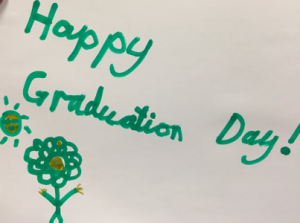 Now that Daisy is graduating, are you proud?
Now that Daisy is graduating, are you proud?
We are very proud of Daisy! She started not being able to say a single word, and now she is able to give two word utterances (get bag, eat cookie, drink juice) like other toddlers her age.
Now she has a wide range of functional play skills, too.
What sort of play does she do?
She does many types of play. She would do pretend cooking, she would have pretend tea parties. My favorite is when she would put on her little sunglasses and her play hat and say ‘Mommy’ (pretending to be mommy).
That is amazing progress! Are her skills now fully in line with typical children her age?
Yes, in all skill domains – social, play, functional communication, gross motor, fine motor. Daisy has done very well and all her scores are in line with typical peers.
What tips do you have for Daisy’s parents as Daisy graduates?
Continue monitoring her progress and be in close contact with her teachers. Daisy will be going to a standard mainstream school, with more children in a classroom. The teachers need to let the parents know how she is doing and to keep providing her with great support.
Are you excited for her graduation?
Yes, we are having her favorite toys for her graduation ceremony this Thursday (26 Mar 2015). We will very much miss our little Daisy. We will miss her quiet little footsteps and her shy but sweet little smile. We will miss how she loves to play peek-a-boo with all of us. We will miss her little toddler feet going up and down our slide. But we are so very proud to see her go.
Be happy and keep making us proud, Daisy!
ABC CENTER SINGAPORE is part of the global network of Applied Behavior Consultants – a global entity that has been serving children with autism for over 25 years in 4 continents worldwide. Our early intervention services include 1 on 1 ABA therapy , Infant/Toddler 1on1 ABA Program, well as our EarlyPreps group preschool program.
Our EarlyPreps group preschool is the only ABA-based program within the Singapore MSF PPIP program where Singaporean/PR children who meet requirements may apply for financial subsidy.
BACK TO ABC CENTER SINGAPORE HOME PAGE
 *Child’s name and all photos are altered for confidentiality.
*Child’s name and all photos are altered for confidentiality.

